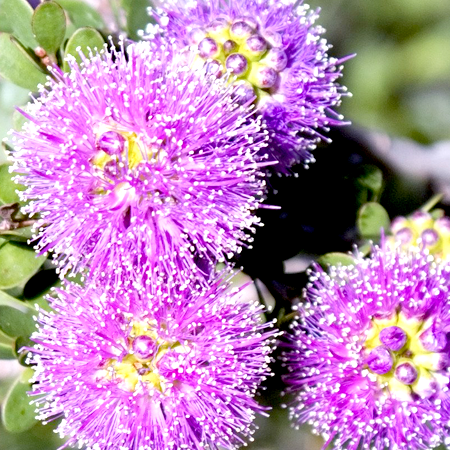

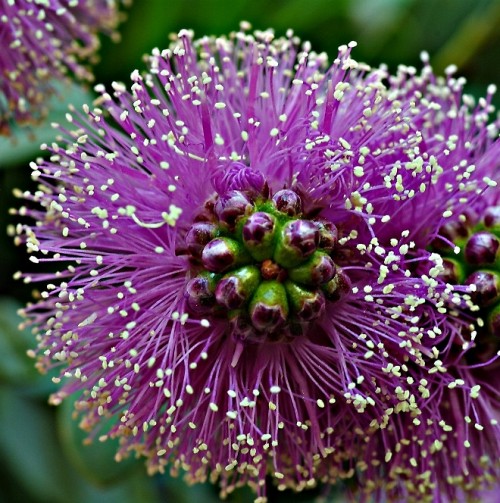
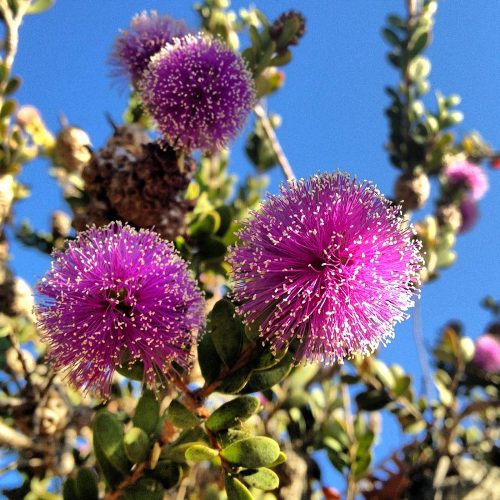
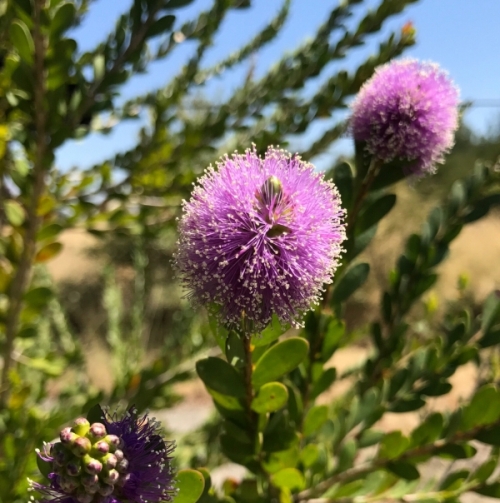
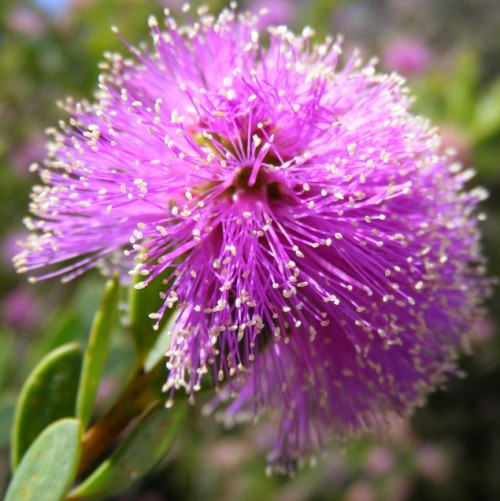
Botanical name Melaleuca teretifolia
Family Myrtaceae
Source Leaves
Origin Australia
Processing Method Steam Distillation
Color/Consistency A thin Clear to yellow colour.
Aromatic Summary / Note / Strength of Aroma Watery, scent citrus, lemon, honey, fresh.
Blends With Blue Cypress, Emerald Cypress, Eucalyptus Varieties, Nerolina, Niaouli, Rosalina, Sandalwood or Tea Tree.
Product Abstract
Honey myrtle has even more antimicrobial properties than Tea Tree. Melaleuca teretifolia has the highest citral content of all the Melaleucas. It has a pleasant slightly sweet lemony aroma that smells somewhat like Lemongrass with undertones of warm honey. It is a great deodorizer and room freshener.
History
Melaleuca teretifolia was first formally described in 1837 by Stephan Endlicher in Enumaratio Plantarum. The specific epithet (teretifolia) is from derived from the Latin words teres meaning "rounded":249 and folium meaning "a leaf":123 referring to the shape of the leaves as being almost circular in cross-section.
Harvesting/Extraction Information
Honey Myrtle essential oil is extracted via steam distillation of the middle and upper stem, branchlets and leaves.
Honey Myrtle is grown in plantations in south western Western Australia. A husband and wife team on their south west Western Australia rural property, discovered a sweet lemon plant down by some wetlands, they had discovered a lovely variant of Honey Myrtle, richer in lemon oil compounds than other Honey Myrtles. They have gone on to propagate over 20,000 of these superior lemon scented Honey Myrtles on their property.
Common Usage
Caution
Dilute before use; for external use only. May cause skin irritation in some individuals; a skin test is recommended prior to use. Contact with eyes should be avoided.
Key constituents
Geranial 37.5%
Neral 29.0%
b-Myrcene 10.9%
Geraniol 3.4%
Nerol 2.8%
(E)-Isocitral 2.3%
1,8-Cineole 2.0%
(Z)-Isocitral 1.5%
a-Pinene 1.2%
Geranyl acetate 1.0%
Safety summary
Hazards Drug interaction; teratogenicity; skin sensitization.
Cautions (all routes) Drugs metabolized by CYP2B6 (Appendix B).
Cautions (oral) Diabetes medication, pregnancy.
Cautions (dermal) Hypersensitive, diseased or damaged skin, children under 2 years of age.
Maximum daily oral dose in pregnancy 63 mg
Maximum dermal use level 0.9%
Our safety advice
We recommend a dermal maximum of 0.9% to avoid skin sensitization, and a daily oral maximum in pregnancy of 63 mg. This is based on 66.5% citral content, with dermal and oral citral limits of 0.6% and 0.6 mg/kg.
Regulatory guidelines
IFRA recommends a maximum dermal use level for citral of 0.6% for body oils and lotions, in order to avoid skin sensitization.
Organ-specific effects
Adverse skin reactions No information found. Citral (geranialþneral) is a potential skin sensitizer .
Cardiovascular effects: Gavage doses of 10, 15 or 20 mg/kg/ day citral for 28 days, dose-dependently lowered plasma insulin levels and increased glucose tolerance in obese rats.
Reproductive toxicity Citral is dose-dependently teratogenic because it inhibits retinoic acid synthesis, and this can affect fetal development.
Drug interactions Antidiabetic medication, because of cardiovascular effects, above. See Table 4.10B. Since citral and geraniol inhibit CYP2B6, there is a theoretical risk of interaction between honey myrtle oil and drugs metabolized by this enzyme.
Systemic effects
Acute toxicity No information found.
Carcinogenic/anticarcinogenic potential No information was found for honey myrtle oil but it contains no known carcinogens. Citral (geranialþneral) and geraniol display anticarcinogenic activity.
Comments
Limited availability. There is also a 1,8-cineole chemotype, which is not produced commercially.